Introduction
As concerns about climate change grow and energy costs rise, more homebuyers are seeking energy-efficient homes. These homes not only lower utility bills but also reduce the environmental footprint by using fewer resources. This article will explore how energy-efficient homes benefit both homeowners and the environment.
1. Lower Utility Costs
One of the most immediate advantages of energy-efficient homes is the reduction in utility costs. Energy-efficient homes use advanced technology and materials to optimize energy use, such as better insulation, energy-efficient windows, and appliances with low energy consumption.
- Key Features:
- Insulation: High-quality insulation in walls, ceilings, and floors reduces heating and cooling needs, keeping homes warmer in the winter and cooler in the summer.
- Energy-Efficient Windows: Double or triple-pane windows with special coatings minimize heat loss, reducing reliance on heating and cooling systems.
- Smart Thermostats: These devices allow homeowners to control heating and cooling remotely, optimizing energy use based on daily routines.
2. Environmental Benefits
Energy-efficient homes help reduce the environmental impact by lowering energy consumption and greenhouse gas emissions. By using less electricity, gas, and water, these homes contribute to a more sustainable future.
- Key Environmental Features:
- Solar Panels: Some energy-efficient homes integrate solar panels to generate clean, renewable energy, reducing dependence on fossil fuels.
- Efficient Water Use: Low-flow faucets, showerheads, and toilets conserve water, helping reduce the strain on local water supplies.
- Sustainable Building Materials: The use of eco-friendly materials, such as recycled wood or steel, reduces the carbon footprint of home construction.
3. Increased Home Value
Energy-efficient homes are highly sought after in the real estate market. Buyers are willing to pay more for homes that offer long-term cost savings and are environmentally friendly. As energy-efficient homes become more popular, they tend to hold their value better and may appreciate faster than less efficient properties.
- Tip for Buyers: Look for homes with energy certifications like ENERGY STAR® or LEED, which indicate a home’s high energy performance.
4. Health and Comfort
Energy-efficient homes also provide enhanced comfort and improved indoor air quality. The use of better ventilation systems, air purifiers, and energy-efficient HVAC systems helps maintain a consistent indoor temperature and reduce allergens, mold, and pollutants.
- Improved Indoor Air Quality: Homes with energy-efficient ventilation systems filter air more effectively, reducing exposure to indoor pollutants.
- Comfortable Living Environment: With proper insulation and modern HVAC systems, these homes maintain stable indoor temperatures, eliminating hot or cold spots.
Conclusion
Energy-efficient homes offer significant benefits, from reducing utility costs to contributing to a healthier environment. For homeowners, these properties provide long-term savings and improved comfort, while helping to combat climate change. Investing in energy-efficient homes is not only a smart financial decision but also a step toward a more sustainable future.

